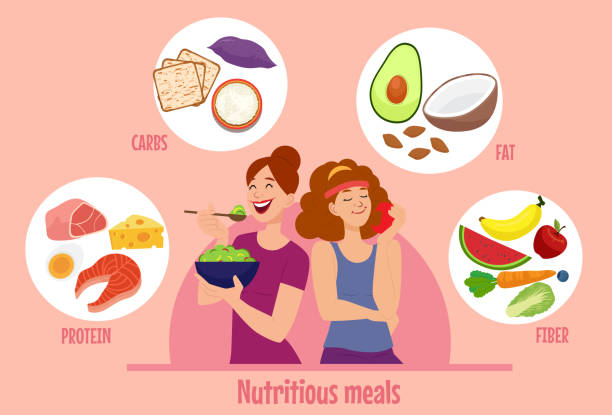Healthy eating doesn’t have to be complicated. In fact, adopting a nutritious diet can be quite simple when you understand the basics of nutrition and implement easy-to-follow strategies. By focusing on whole foods, mindful eating, and balanced meal planning, you can develop healthy eating patterns that promote overall well-being. Let’s explore some practical tips to make healthy eating a breeze.
Introduction to Healthy Eating Patterns
Healthy eating patterns encompass more than just what you eat; they also include how you eat. It’s about nourishing your body with wholesome foods while fostering a positive relationship with food. Rather than restrictive diets or quick fixes, healthy eating is a sustainable approach to nutrition that prioritizes long-term health and vitality.
Understanding Macronutrients and Micronutrients
What Are Macronutrients?
Macronutrients, namely carbohydrates, proteins, and fats, are the building blocks of a balanced diet. Carbohydrates provide energy, proteins support muscle growth and repair, and fats are essential for hormone production and nutrient absorption.
Importance of Micronutrients
Micronutrients, such as vitamins and minerals, are vital for various bodily functions, including immune function, bone health, and metabolism. Focusing on micronutrient-rich foods ensures that your body receives the nutrients it needs to thrive.
Building a Balanced Plate
Incorporating Whole Foods
Aim to fill your plate with whole, minimally processed foods such as fruits, vegetables, lean proteins, and whole grains. These foods are rich in nutrients and fiber, promoting satiety and overall health.
Portion Control
While nutrient-dense foods are beneficial, portion control is key to maintaining a healthy weight and preventing overeating. Be mindful of portion sizes and listen to your body’s hunger and fullness cues.
Meal Planning Made Easy
Benefits of Meal Planning
Meal planning saves time, reduces stress, and promotes healthier eating habits. By preparing meals in advance, you can ensure that nutritious options are readily available and avoid the temptation of unhealthy takeout or convenience foods.
Tips for Successful Meal Planning
Start by creating a weekly meal plan, incorporating a variety of foods to keep meals exciting. Batch cook staples such as grains, proteins, and vegetables to streamline meal preparation throughout the week.
Healthy Eating : Snacking Habits

Choosing Nutrient-Dense Snacks
Opt for nutrient-dense snacks such as fresh fruit, nuts, yogurt, or vegetables with hummus. These snacks provide sustained energy and essential nutrients without added sugars or artificial ingredients.
Avoiding Processed Foods
Limit your intake of processed snacks, which are often high in refined sugars, unhealthy fats, and preservatives. Instead, choose whole food alternatives to support your health and well-being.
Hydration: The Key to Wellness
Importance of Hydration
Staying hydrated is essential for maintaining optimal bodily functions, including digestion, circulation, and temperature regulation. Aim to drink plenty of water throughout the day to support overall hydration.
Creative Ways to Stay Hydrated
In addition to plain water, incorporate hydrating foods such as fruits and vegetables into your diet. Herbal teas, infused water, and coconut water are also refreshing options to keep you hydrated and satisfied.
Mindful Eating Practices
Eating Slowly and Mindfully
Practice mindful eating by savoring each bite, chewing slowly, and paying attention to the sensory experience of eating. This allows you to fully enjoy your meals and tune in to your body’s hunger and fullness signals.
Listening to Your Body’s Hunger Cues
Instead of eating out of habit or emotions, listen to your body’s hunger cues and eat when you’re truly hungry. Likewise, stop eating when you’re comfortably satisfied, rather than overly full.
Incorporating Variety and Moderation
Importance of Variety in Diet
Eating a diverse range of foods ensures that you receive a wide array of nutrients and phytochemicals. Experiment with different flavors, textures, and cuisines to keep meals interesting and nutritious.
Practicing Moderation with Indulgences
While it’s important to enjoy treats in moderation, be mindful of portion sizes and frequency. Savor your favorite indulgences occasionally, but prioritize nourishing foods that support your health and well-being.
Healthy Eating : The Role of Physical Activity

Combining Exercise with Nutrition
Pairing regular physical activity with a balanced diet enhances overall health and promotes weight management. Find activities you enjoy, whether it’s walking, cycling, yoga, or dancing, and incorporate them into your routine.
Finding Activities You Enjoy
Physical activity doesn’t have to feel like a chore. Choose activities that bring you joy and fit your lifestyle, whether it’s outdoor adventures, group fitness classes, or solo workouts at home.
Overcoming Challenges and Setbacks
Dealing with Cravings and Temptations
Cravings are a natural part of life, but they don’t have to derail your healthy eating efforts. Identify triggers for cravings and find alternative ways to cope, such as going for a walk, practicing mindfulness, or enjoying a healthy snack.
Strategies for Getting Back on Track
If you veer off course from your healthy eating plan, don’t dwell on setbacks. Instead, focus on making positive choices moving forward and recommitting to your goals. Remember that progress is not linear, and every healthy choice counts.
Sustainable Changes for Long-Term Success
Gradual Lifestyle Modifications
Rather than making drastic changes overnight, focus on making small, sustainable modifications to your lifestyle. Whether it’s swapping out sugary drinks for water or adding an extra serving of vegetables to your meals, every positive change contributes to your overall health.
Celebrating Progress
Celebrate your successes along the way, whether it’s reaching a fitness milestone, mastering a new recipe, or simply feeling more energized and vibrant. Acknowledge the progress you’ve made and use it as motivation to continue on your journey to better health.
Embracing Flexibility
While consistency is key to establishing healthy eating patterns, it’s also important to embrace flexibility and forgiveness. There will be times when life gets busy, or you may indulge in less nutritious foods, and that’s okay. Instead of dwelling on setbacks, focus on making positive choices moving forward and returning to your healthy habits as soon as possible. Remember that perfection is not attainable, and it’s the overall pattern of your eating habits that matters most.
Seeking Support
Don’t hesitate to seek support from friends, family, or a professional if you’re struggling to maintain healthy eating habits. Surround yourself with people who share your goals and can provide encouragement, accountability, and practical advice. Whether it’s joining a cooking class, participating in a support group, or seeking guidance from a registered dietitian, having a support system in place can make all the difference in your journey towards long-term success.
Conclusion
Healthy eating patterns are attainable for anyone, regardless of age, budget, or dietary preferences. By prioritizing whole foods, mindful eating, and balanced nutrition, you can cultivate habits that support your long-term health and well-being. Remember that consistency and moderation are key, and be kind to yourself as you navigate your wellness journey.



